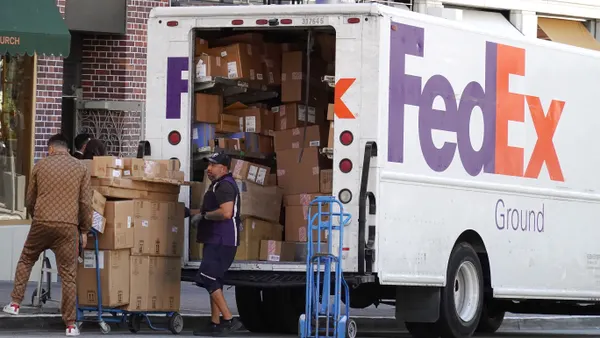Dive Brief:
- Freightos, a digitized freight company, has received $25 million in Series B funding, bringing the company's total current funding to $50 million, a company press release announced.
- Freightos, which launched in 2016, has seen a 100% increase in orders since Q4 2016. The company supplies 1,000 users and the top twenty global freight forwarders.
- The Freightos International Freight Index offers free global freight rate comparisons and insights.
Dive Insight:
Freightos launched its cloud-based freight marketplace Freightos International Freight Index (FIFI) in February, a freely-provided week-by-week list of benchmark prices for ocean freight shipping on three trade lanes. The digitized freight company is considered an industry disruptor, thanks to its ability to remove access barriers to data, thereby dismantling the established manual reporting process, so long relied on by freight forwarders.
“The industry suffers from a lack of both accountability and digitalization between carriers, shippers, and logistics providers," Dr. Zvi Schreiber, founder and CEO of Freightos, told Supply Chain Dive. "Freightos digitizes the connection between these players and welcomes NYSHEX’s vision of standardizing forward contracts to enhance industry accountability. With Freightos digitalizing pricing and booking, and NYSHEX ensuring compliance, the industry will be able focus less on manual processes and more on improving efficiency and service.”
To many, with digitizing becoming the wave of the future in various aspects of the shipping industry, Freightos and other systems like it would seem to hold all the cards. Funding is available and orders are increasing exponentially. Another model has manifested, one that seeks collaboration rather than disruption: the New York Shipping Exchange, or NYSHEX.
NYSHEX, which also received funding from GE Ventures, relies on a contract-based system rather than an up to the moment global shipping rate aggregator. Where Freightos works around the issue of shipper-carrier distrust by simply presenting current rates (albeit in a rapid-fire manner), NYSHEX addresses it directly through binding contract creation, which obligates both parties to pay a fee if there's a no-show or a rollover, both of which hurt the parties involved. And, while the NYSHEX is alleged to favor carriers, there's a mere 5% difference in fines incurred, with 35% levied for carriers who roll over cargo, and 40% for shippers who overbook and then don't show.
Which system will prevail? Perhaps there's room for both options in an industry struggling to find its sea legs after months on dry land.













